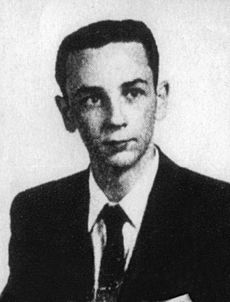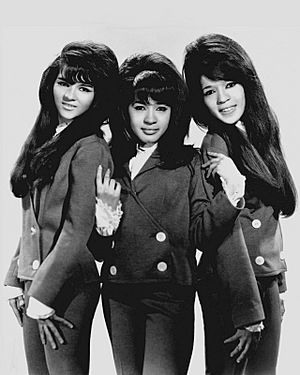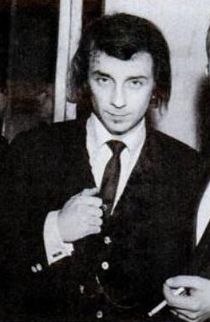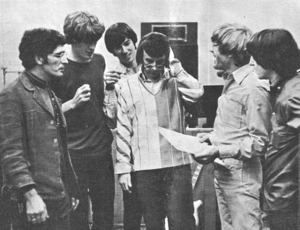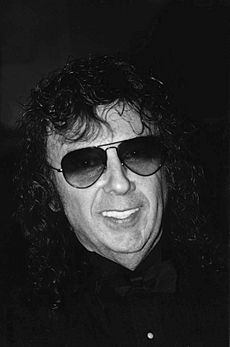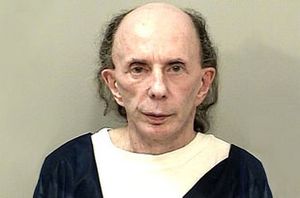Phil Spector facts for kids
Quick facts for kids Phil Spector |
|
|---|---|
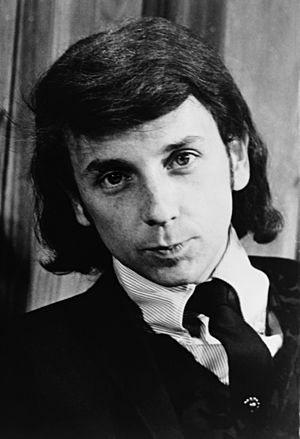
Spector in 1965
|
|
| Background information | |
| Birth name | Harvey Philip Spector |
| Also known as | Phil Harvey |
| Born | December 26, 1939 New York City, U.S. |
| Origin | Los Angeles, California, U.S. |
| Died | January 16, 2021 (aged 81) French Camp, California, U.S. |
| Genres | |
| Occupation(s) |
|
| Years active | 1958–2009 |
| Labels |
|
Harvey Phillip Spector (born Harvey Philip Spector; December 26, 1939 – January 16, 2021) was an American record producer and songwriter, best known for his innovative recording practices and entrepreneurship in the 1960. Spector developed the Wall of Sound, a production style that is characterized for its diffusion of tone colors and dense orchestral sound, which he described as a "Wagnerian" approach to rock and roll. He is widely regarded as one of the most influential figures in pop music history and one of the most successful producers of the 1960s.
Born in the Bronx, Spector moved to Los Angeles as a teenager and began his career in 1958 as a founding member of the Teddy Bears, for whom he penned "To Know Him Is to Love Him", a U.S. number-one hit. In 1960, after working as an apprentice to Leiber and Stoller, Spector co-founded Philles Records, and at the age of 21 became the youngest ever U.S. label owner to that point. Dubbed the "First Tycoon of Teen", Spector came to be considered the first auteur of the music industry for the unprecedented control he had over every phase of the recording process. He produced acts such as the Ronettes, the Crystals, and Ike & Tina Turner, and typically collaborated with arranger Jack Nitzsche and engineer Larry Levine. The musicians from his de facto house band, later known as "the Wrecking Crew", rose to industry fame through his hit records.
In the early 1970s, Spector produced the Beatles' Let It Be and several solo records by John Lennon and George Harrison. By the mid-1970s Spector had produced eighteen U.S. Top 10 singles for various artists. His chart-toppers included the Righteous Brothers' "You've Lost That Lovin' Feelin'", the Beatles' "The Long and Winding Road", and Harrison's "My Sweet Lord". Following one-off productions for Leonard Cohen (Death of a Ladies' Man), Dion DiMucci (Born to Be with You), and the Ramones (End of the Century), Spector remained largely inactive.
Spector helped establish the role of the studio as an instrument, the integration of pop art aesthetics into music (art pop), and the genres of art rock and dream pop. His honors include the 1973 Grammy Award for Album of the Year for co-producing Harrison's Concert for Bangladesh, a 1989 induction into the Rock and Roll Hall of Fame, and a 1997 induction into the Songwriters Hall of Fame. In 2004, Spector was ranked number 63 on Rolling Stone's list of the greatest artists in history. In 2009, after spending three decades in semi-retirement, he was convicted for the 2003 murder of the actress Lana Clarkson and sentenced to 19 years to life in prison. He died in prison in 2021.
Contents
- Biography
- 1939–1959: Background and the Teddy Bears
- 1959–1962: Early production work, Philles Records, and the Crystals
- 1962–1965: Bob B. Soxx & the Blue Jeans, the Ronettes, and the Righteous Brothers
- 1966–1969: Ike & Tina Turner and hiatus
- 1970–1973: Comeback and Beatles collaborations
- 1974–1980: Near-fatal accident, Warner-Spector Records, Leonard Cohen, and the Ramones
- 1981–2003: Inactivity
- 2003–2021: Clarkson murder and imprisonment
- Personal life
- Awards
- See also
Biography
1939–1959: Background and the Teddy Bears
Harvey Philip Spector was born on December 26, 1939. He later added a second "l" to his middle name, which he preferred over "Harvey". His parents were Benjamin (1903–1949) and Bertha (1911–1995) Spector, a first-generation immigrant Russian-Jewish family in the Bronx, New York City. Bertha had been born in France to Russian migrants George and Clara Spektor, who brought her to America in 1911 aged 9 months, while Benjamin was born as Baruch (later changed to Benjamin) in the Russian Empire to George and Bessie Spektus or Spektres, and brought to America by his parents in 1913 aged 10. Both families anglicized their last names to "Spector" on their naturalization papers, both of which were witnessed by the same man, Isidore Spector. The similarities in name and background of the grandfathers led Spector to believe that his parents were first cousins. He had a sister named Shirley, who was six years his senior; she died in 2004 in Hemet, California, at the age of 70.
In April 1949, Spector's father, died. In 1953, Spector's mother moved the family to Los Angeles where she found work as a seamstress. Spector attended John Burroughs Junior High School (now John Burroughs Middle School) on Wilshire Boulevard, then in 1954 transferred to Fairfax High School. Having learned to play guitar, Spector performed "Rock Island Line" in a talent show at Fairfax High. He joined a loose-knit community of aspiring musicians, including Lou Adler, Bruce Johnston, Steve Douglas, and Sandy Nelson. Spector formed a group, the Teddy Bears, with Nelson and two other friends, Marshall Leib and Annette Kleinbard.
During this period, record producer Stan Ross—co-owner of Gold Star Studios in Hollywood—began to tutor Spector in record production and exerted a major influence on Spector's production style. In 1958, the Teddy Bears recorded the Spector-penned "Don't You Worry My Little Pet", and then signed a two to three singles recording deal with Era Records, with the promise of more if the singles did well.
At their next session, they recorded another song Spector had written—this one inspired by the epitaph on Spector's father's tombstone. Released on Era's subsidiary label, Dore Records, "To Know Him Is to Love Him" reached number one on Billboard Hot 100 singles chart on December 1, 1958, selling over a million copies by year's end. Following the success of their debut, the group signed with Imperial Records. Their next single, "I Don't Need You Anymore", reached number 91. They released several more recordings, including an album, The Teddy Bears Sing!, but failed to reach the top 100 in US sales. The group disbanded in 1959.
1959–1962: Early production work, Philles Records, and the Crystals
While recording the Teddy Bears' album, Spector met Lester Sill, a former promotion man who was a mentor to Jerry Leiber and Mike Stoller. Sill and his partner, Lee Hazlewood supported Spector's next project, the Spectors Three. In 1960, Sill arranged for Spector to work as an apprentice to Leiber and Stoller in New York. Spector co-wrote the Ben E. King Top 10 hit "Spanish Harlem" with Leiber and also worked as a session musician, playing the guitar solo on the Drifters' song "On Broadway".
Spector's first true recording artist and project as producer was Ronnie Crawford. Spector's production work during this time included releases by LaVern Baker, Ruth Brown, and Billy Storm, as well as the Top Notes' original recording of "Twist and Shout". Leiber and Stoller recommended Spector to produce Ray Peterson's "Corrine, Corrina", which reached number 9 in January 1961. Later, he produced another major hit for Curtis Lee, "Pretty Little Angel Eyes", which made it to number 7. Returning to Hollywood, Spector agreed to produce one of Sill's acts. After both Liberty Records and Capitol Records turned down the master of "Be My Boy" by the Paris Sisters, Sill formed a new label, Gregmark Records, with Lee Hazlewood, and released it. It reached only number 56, but the follow-up, "I Love How You Love Me", was a hit, reaching number 5.
In late 1961, Spector formed a record company with Sill, who by this time had ended his business partnership with Hazlewood. Philles Records combined the first names of its two founders. Through Hill and Range Publishers, Spector found three groups he wanted to produce: the Ducanes, the Creations, and the Crystals. The first two signed with other companies, but Spector managed to secure the Crystals for his new label. Their first single, "There's No Other (Like My Baby)" was a success, hitting number 20. Their next release, "Uptown", made it to number 13.
Spector continued to work freelance with other artists. In 1962, he produced "Second Hand Love" by Connie Francis, which reached No. 7. Ahmet Ertegun of Atlantic paired Spector with future Broadway star Jean DuShon for "Talk to Me", the B-side of which was "Tired of Trying", written by DuShon.
1962–1965: Bob B. Soxx & the Blue Jeans, the Ronettes, and the Righteous Brothers
In 1962, Spector briefly took a job as an A&R producer for Liberty Records. It was while working at Liberty that he heard a song written by Gene Pitney, for whom he had produced a number 41 hit, "Every Breath I Take", a year earlier. "He's a Rebel" was due to be released on Liberty by Vikki Carr, but Spector rushed into Gold Star Studios and recorded a cover version using Darlene Love and the Blossoms on lead vocals. The record was released on Philles, attributed to the Crystals, and quickly rose to the top of the charts.
By the time "He's a Rebel" went to number 1, Lester Sill was out of the company, and Spector had Philles all to himself. He created a new act, Bob B. Soxx & the Blue Jeans, featuring Darlene Love, Fanita James (a member of the Blossoms), and Bobby Sheen, a singer he had worked with at Liberty. The group had hits with "Zip-a-Dee-Doo-Dah" (number 8), "Why Do Lovers Break Each Other's Heart" (number 38), and "Not Too Young to Get Married" (number 63). Spector also released solo material by Darlene Love in 1963. In the same year, he released "Be My Baby" by the Ronettes, which went to number 2.
The first time Spector put the same amount of effort into an LP as he did into 45s was when he utilized the full Philles roster and the Wrecking Crew to make what he felt would become a hit for the 1963 Christmas season. A Christmas Gift for You from Philles Records was released a few days after the assassination of President Kennedy in November 1963.
On September 28, 1963, the Ronettes appeared at the Cow Palace, near San Francisco. Also on the bill were the Righteous Brothers. Spector, who was conducting the band for all the acts, was so impressed with Bill Medley and Bobby Hatfield that he bought their contract from Moonglow Records and signed them to Philles. In early 1965, "You've Lost That Lovin' Feelin'" became the label's second number 1 single. Three more major hits with the duo followed: "Just Once in My Life" (number 9), "Unchained Melody" (number 4, originally the B-side of "Hung on You"), and "Ebb Tide" (number 5). Despite having hits, he lost interest in producing the Righteous Brothers and sold their contract and all their master recordings to Verve Records. However, the sound of the Righteous Brothers' singles was so distinctive that the act chose to replicate it after leaving Spector, notching a second number 1 hit in 1966 with the Bill Medley–produced "(You're My) Soul and Inspiration".
During this period, Spector formed another subsidiary label, Phi-Dan Records, partly created to keep promoter Danny Davis occupied. The label released singles by artists including Betty Willis, the Lovelites, and the Ikettes. None of the recordings on Phi-Dan were produced by Spector.
The recording of "Unchained Melody", credited on some releases as a Spector production although Medley has consistently said he produced it originally as an album track, had a second wave of popularity 25 years after its initial release, when it was featured prominently in the 1990 hit movie Ghost. A re-release of the single re-charted on the Billboard Hot 100, and went to number one on the Adult Contemporary charts. This also put Spector back on the U.S. Top 40 charts for the first time since his last appearance in 1971 with John Lennon's "Imagine", though he did have UK top 40 hits in the interim with the Ramones.
1966–1969: Ike & Tina Turner and hiatus
Spector's final signing to Philles was the husband-and-wife team of Ike & Tina Turner in April 1966. Spector considered their single "River Deep – Mountain High" his best work, but it failed to reach any higher than number 88 in the United States. The record, which actually featured Tina Turner without Ike Turner, was successful in Britain, reaching number 3.
Spector released another single by Ike & Tina Turner, "I'll Never Need More Than This", while negotiating a deal to move Philles to A&M Records in 1967. The deal did not materialize, and Spector subsequently lost enthusiasm for his label and the recording industry. Already something of a recluse, he withdrew temporarily from the public eye, marrying Veronica "Ronnie" Bennett, lead singer of the Ronettes, in 1968. Spector emerged briefly for a cameo as himself in an episode of I Dream of Jeannie (1967) and in the film Easy Rider (1969).
In 1969, Spector made a brief return to the music business by signing a production deal with A&M Records. A Ronettes single, "You Came, You Saw, You Conquered" flopped, but Spector returned to the Hot 100 with "Black Pearl", by Sonny Charles and the Checkmates, Ltd., which reached number 13.
1970–1973: Comeback and Beatles collaborations
In early 1970, Allen Klein, the new manager of the Beatles, brought Spector to England. After impressing with his production of John Lennon's solo single "Instant Karma!", which went to number 3, Spector was invited by Lennon and George Harrison to take on the task of turning the Beatles' abandoned Let It Be recording sessions into a usable album. He went to work using many of his production techniques, making significant changes to the arrangements and sound of some songs. Released a month after the Beatles' break-up, the album topped the U.S. and UK charts. It also yielded the number 1 U.S. single "The Long and Winding Road". Spector's overdubbing of "The Long and Winding Road" infuriated its composer, Paul McCartney. Several music critics also maligned Spector's work on Let It Be; he later attributed this partly to resentment that an American producer appeared to be "taking over" such a popular English band.
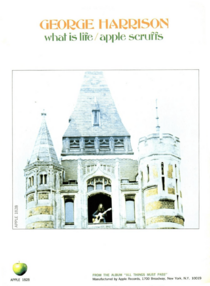
For Harrison's multiplatinum album All Things Must Pass (number 1, 1970), Spector helped provide a symphonic ambience, although his health issues meant that after recording the basic tracks, he was absent from the project until the mixing stage. Rolling Stone's reviewer lauded the album's sound, calling it "Wagnerian, Brucknerian, the music of mountain tops and vast horizons". The triple LP yielded two major hits: "My Sweet Lord" (number 1) and "What Is Life" (number 10). That same year, Spector co-produced Lennon's Plastic Ono Band (number 6), a stark-sounding album devoid of any Wall of Sound extravagance. Through Harrison, he also produced the debut single by Derek and the Dominos, "Tell the Truth", but the band disliked the sound and had the record withdrawn.
Spector was made head of A&R for Apple Records. He held the post for only a year, during which he co-produced Lennon's 1971 single "Power to the People" (number 11) and his chart-topping album Imagine. The album's title track hit number 3. With Harrison, Spector co-produced Harrison's "Bangla Desh" (number 23)—rock's first charity single—and wife Ronnie Spector's "Try Some, Buy Some" (number 77). Spector was convinced that the Harrison-written single would be a major hit, and its poor commercial performance was one of the biggest disappointments of his career.
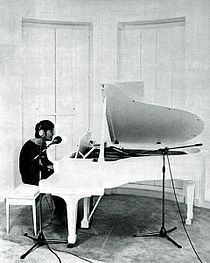
That same year Spector oversaw the live recording of the Harrison-organized Concert for Bangladesh shows in New York City, which resulted in the number 1 triple album The Concert for Bangladesh. The album won the "Album of the Year" award at the 1973 Grammys. Despite being recorded live, Spector used up to 44 microphones simultaneously to create his trademark Wall of Sound. Following Harrison's death in 2001, Spector said that the most creative period of his career was when he worked with Lennon and Harrison in the early 1970s, and he believed that this was true of Lennon and Harrison also, despite their achievements with the Beatles.
Lennon retained Spector for the 1971 Christmas single "Happy Xmas (War Is Over)" and the poorly reviewed 1972 album Some Time in New York City (number 48), both collaborations with Yoko Ono. In late 1972, Apple reissued Spector's A Christmas Gift for You from Philles Records (as Phil Spector's Christmas Album), bringing the recordings the commercial success and critical recognition that had originally eluded the 1963 release. Lennon and Ono's "Happy Xmas" single similarly stalled in sales upon its initial release, but later became a fixture on radio station playlists around Christmas.
Harrison and Spector started work on Harrison's Living in the Material World album in October 1972, but Spector's unreliability soon led to Harrison dismissing him from the project. Harrison recalled having to climb down into Spector's central London hotel room from the roof to get him to attend the sessions, and that his co-producer would then need "eighteen cherry brandies before he could get himself down to the studio".
In late 1973, Spector produced the initial recording sessions for what became Lennon's 1975 covers album Rock 'n' Roll (number 6). The sessions were held in Los Angeles, with Lennon allowing Spector free rein as producer for the first time. In December, Lennon and Spector abandoned the collaboration. Since the studio time had been booked by his production company, Spector withheld the tapes until June the following year, when Lennon reimbursed him through Capitol Records.
1974–1980: Near-fatal accident, Warner-Spector Records, Leonard Cohen, and the Ramones
As the 1970s progressed, Spector became increasingly reclusive. The most probable and significant reason for his withdrawal, according to biographer Dave Thompson, was that in 1974 he was seriously injured when he was thrown through the windshield of his car in a crash in Hollywood. Spector was almost killed, and it was only because the attending police officer detected a faint pulse that Spector was not declared dead at the scene. He was admitted to the UCLA Medical Center on the night of March 31, suffering serious head injuries that required several hours of surgery, with over 300 stitches to his face and more than 400 to the back of his head. His head injuries, Thompson suggests, were the reason that Spector began his habit of wearing outlandish wigs in later years.
He established the Warner-Spector label with Warner Bros. Records, which undertook new Spector-produced recordings with Cher, Darlene Love, Danny Potter, and Jerri Bo Keno, in addition to several reissues. A similar relationship with Britain's Polydor Records led to the formation of the Phil Spector International label in 1975. When the Cher and Keno singles (the latter's recordings were only issued in Germany) foundered on the charts, Spector released Dion DiMucci's Born to Be with You to little commercial fanfare in 1975; largely produced and recorded by Spector in 1974, it was subsequently disowned by the singer. In the 1990s and 2000s, the album enjoyed a resurgence among the indie rock cognoscenti. The majority of Spector's classic Philles recordings had been out of print in the U.S. since the original label's demise, although Spector had released several Philles Records compilations in Britain. Finally, he released an American compilation of his Philles recordings in 1977, which put most of the better-known Spector hits back into circulation after many years.
Spector began to reemerge later in the decade, producing and co-writing a 1977 album by Leonard Cohen, titled Death of a Ladies' Man. After Cohen had laid down practice vocal tracks, Spector mixed the album in studio sessions, rather than allowing Cohen to take a role in the mixing, as Cohen had previously done. Cohen remarked that the result is "grotesque", but also "semi-virtuous"—for many years, he included a reworked version of the track "Memories" in live concerts. Bob Dylan and Allen Ginsberg also participated in the background vocals on "Don't Go Home with Your Hard-On".
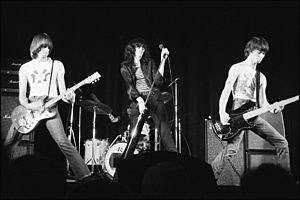
Spector also produced the much-publicized Ramones album End of the Century in 1979. As with his work with Leonard Cohen, End of the Century received criticism from Ramones fans who were angered over its radio-friendly sound. However, it contains some of the best known and most successful Ramones singles, such as "Rock 'n' Roll High School", "Do You Remember Rock 'n' Roll Radio?", and their cover of a previously released Spector song for the Ronettes, "Baby, I Love You". Guitarist Johnny Ramone later commented on working with Spector on the recording of the album, "It really worked when he got to a slower song like "Danny Says"—the production really worked tremendously. For the harder stuff, it didn't work as well."
Rumors circulated for years that Spector had threatened members of the Ramones with a gun during the sessions. Dee Dee Ramone claimed that Spector once pulled a gun on him when he tried to leave a session. Drummer Marky Ramone recalled in 2008, "They [guns] were there but he had a license to carry. He never held us hostage. We could have left at any time."
1981–2003: Inactivity
Spector remained inactive throughout most of the 1980s, 1990s, and early 2000s. In early 1981, shortly after the death of John Lennon, he temporarily re-emerged to co-produce Yoko Ono's Season of Glass.
In 1989, Tina Turner inducted Spector into the Rock and Roll Hall of Fame as a non-performer. Rolling Stone reported, "Spector hit the stage bopping madly to the strains of the Ronettes' "Be My Baby", flanked by three beefy bodyguards who practically elbowed Tina out of the way. He mumbled a few incoherent words about George H. W. Bush and the presidential inauguration, and then his bodyguards carried him away again." He was inducted into the Songwriters Hall of Fame in 1997 and he received the Grammy Trustees Award in 2000.
In 1994, Spector wrote a letter to the Rock and Roll Hall of Fame's nominating committee to oppose the Ronettes being considered for induction. He argued that the group was not a proper recording act and did not contribute enough to music to merit an induction. The Ronettes were eventually inducted into the Hall, but not until 2007.
He attempted to work with Céline Dion on her album Falling into You but fell out with her production team. His last released project was Silence Is Easy by Starsailor, in 2003. He was originally supposed to produce the entire album, but was fired owing to personal and creative differences. One of the two Spector-produced songs on the album, the title track, was a UK top 10 single (the other single being "White Dove").
2003–2021: Clarkson murder and imprisonment
On February 3, 2003, Spector shot actress Lana Clarkson while in his mansion (the Pyrenees Castle) in Alhambra, California.
Spector remained free on $1 million bail while awaiting trial. In the meantime, Spector produced singer-songwriter Hargo Khalsa's track (known professionally as Hargo) "Crying for John Lennon", which originally appears on Hargo's 2006 album In Your Eyes. On a visit to Spector's mansion for an interview for the Lennon tribute film Strawberry Fields, Hargo played Spector the song and asked him to produce it.
On March 19, 2007, Spector's murder trial began. Presiding Judge Larry Paul Fidler allowed the proceedings in Los Angeles Superior Court to be televised. On September 26, Fidler declared a mistrial because of a hung jury (ten to two for conviction).
The retrial of Spector for murder in the second degree began on October 20, 2008; the retrial was not televised. The case went to the jury on March 26, 2009, and 18 days later, on April 13, the jury returned a guilty verdict. He was immediately taken into custody and, on May 29, 2009, was sentenced to 19 years to life in the California state prison system. Various attempted appeals were unsuccessful, in 2011, 2012, and 2016.
Personal life
Relationships and children
Spector's first marriage was in 1963 to Annette Merar, lead vocalist of the Spectors Three, a 1960s pop trio formed and produced by Spector. Spector named a record company after Merar, Annette Records. Spector and Merar divorced in 1966.
Spector married Ronnie Bennett in 1968 and adopted a son, Donté Phillip Spector. As a Christmas present, Spector surprised her by adopting twins Louis Phillip Spector and Gary Phillip Spector. They divorced in 1974, as she forfeited all future record earnings and surrendered custody of their children.
In 1982, Spector had twin children with his girlfriend Janis Zavala: Nicole Audrey Spector and Phillip Spector Jr. Phillip Jr. died of leukemia in 1991. On September 1, 2006, while on bail and awaiting trial, Spector married his third wife Rachelle Short, who was 26 at the time. Spector filed for divorce in April 2016, claiming irreconcilable differences. They divorced in 2018.
Health, illness, and death
Spector testified in a 2005 court deposition that he had been treated for bipolar disorder ("manic depression") for eight years.
California Department of Corrections photos from 2013 (released in September 2014) show evidence of a progressive deterioration in Spector's health, according to observers. He had been an inmate at the California Health Care Facility (a prison hospital) in Stockton since October 2013. In September 2014, it was reported that Spector had lost his ability to speak, owing to laryngeal papillomatosis.
Spector's daughter Nicole attributed her father's death to complications of COVID-19, with which he was diagnosed in December 2020. He was taken to San Joaquin General Hospital in French Camp, California, on December 31, and intubated in January 2021. Spector died in an outside hospital on January 16 at the age of 81, according to the California Department of Corrections and Rehabilitation. He would have been eligible for parole in 2024.
Awards
Spector is one of a handful of producers to have number one records in three consecutive decades (1950s, 1960s and 1970s). Others in this group include Quincy Jones (1960s, 1970s, and 1980s), George Martin (1960s, 1970s, 1980s, and 1990s), Michael Omartian (1970s, 1980s and 1990s),Jimmy Jam and Terry Lewis (1980s, 1990s, and 2000s), and Max Martin (1990s, 2000, 2010s, and 2020s).
Awards and nominations
| Year | Nominee / work | Award | Result |
|---|---|---|---|
| 1972 | George Harrison "My Sweet Lord" | Grammy Award for Record of the Year | Nominated |
| 1972 | George Harrison All Things Must Pass | Grammy Award for Album of the Year | Nominated |
| 1973 | George Harrison & Friends The Concert for Bangladesh | Grammy Award for Album of the Year | Won |
| 1989 | Phil Spector | Rock and Roll Hall of Fame | Inducted |
| 1997 | Phil Spector | Songwriter's Hall of Fame | Inducted |
| 2000 | Phil Spector | Grammy Trustees Award | Won |
Rankings
| Publication | Country | Accolade | Year | Rank | Ref |
|---|---|---|---|---|---|
| Rolling Stone | US | Greatest Artists of All Time | 2004, updated 2011 | 64 | |
| The Washington Times | US | Greatest Record Producers of All Time | 2008 | 2 |
See also
 In Spanish: Phil Spector para niños
In Spanish: Phil Spector para niños


